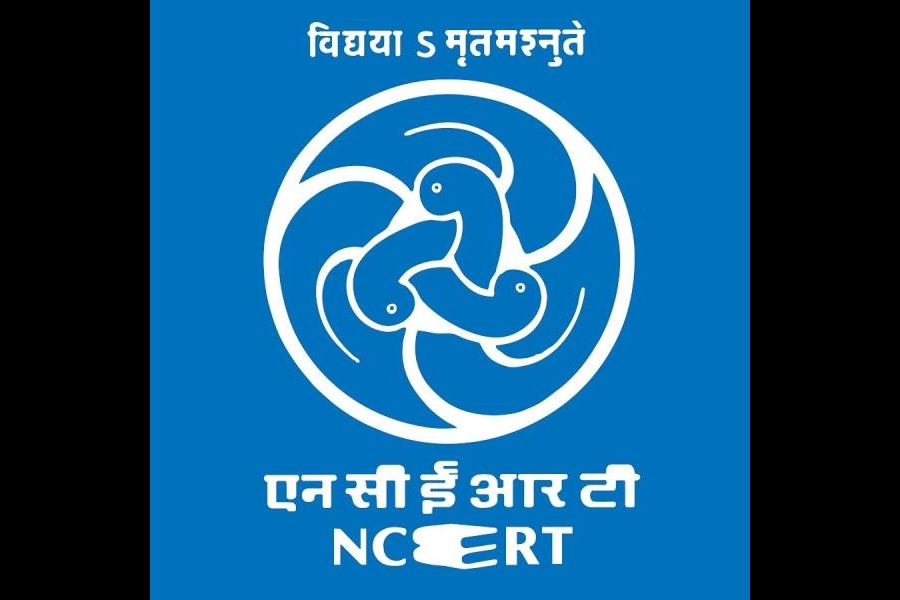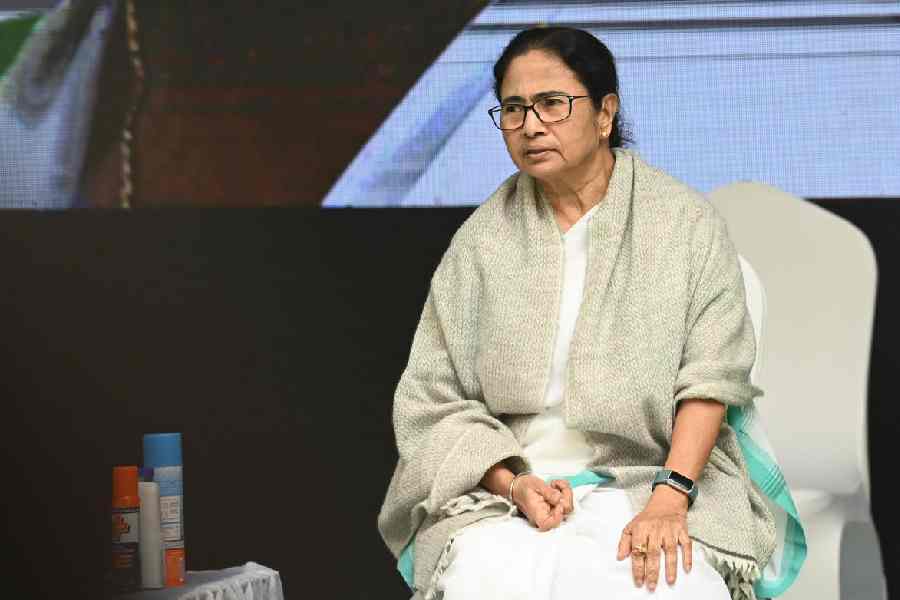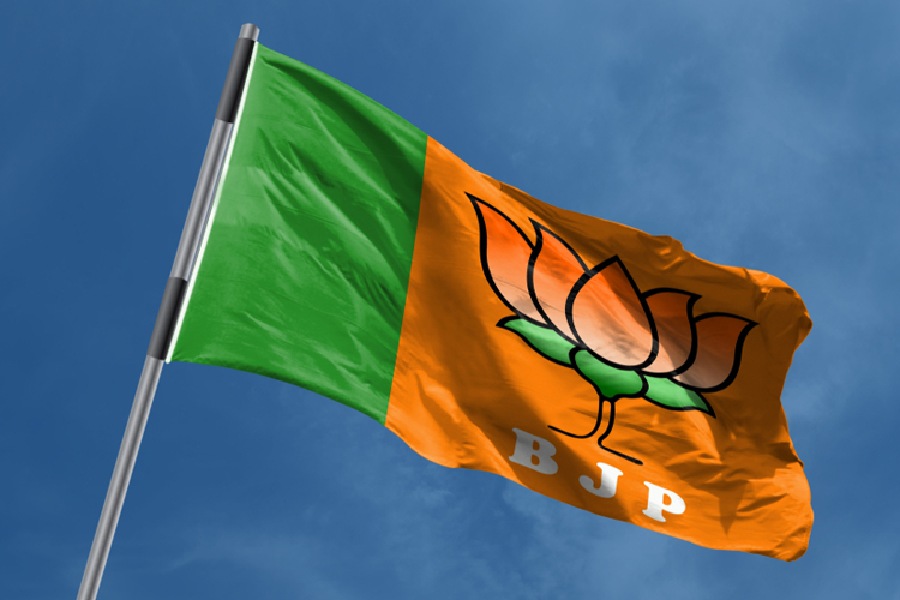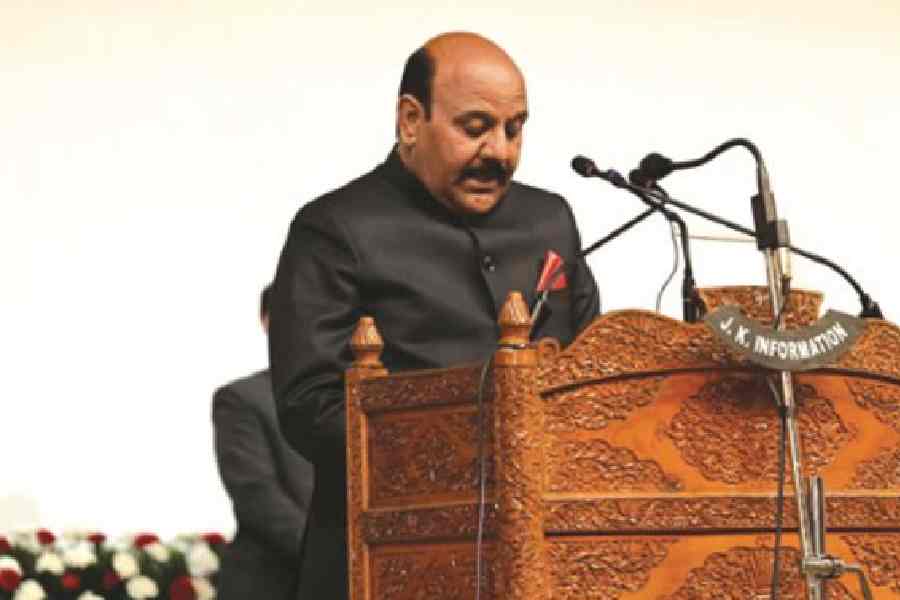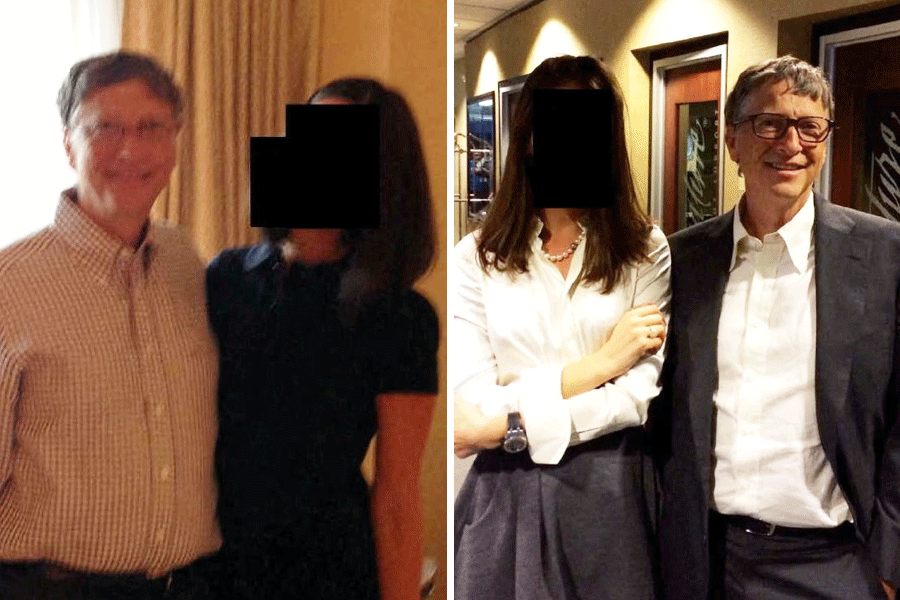.jpg)
Picture by Bhubaneswarananda Halder
It was exactly a year ago that I was in the audience watching the Indian production of Eve Ensler's Vagina Monologues and cracking up at the thought of how all those years of being taught how to be coy and ladylike was snapping with every moan and chant of 'vagina'. And this December here She was right before me flashing her eyes that smile from the cheeks, dancing, hugging, laughing and injecting in me a new body language during the two days spent as a part of her V-team. A chat, in the car between Sonagachhiand GD Birla Sabhagaron Friday, with The Woman I want to be when I grow up. Yes, The Woman called Eve Ensler.
Two days in Calcutta spent with survivors, students and women from different walks of life including girls in Sonagachhi... what have been the high points for you?
I think that wild dancing with the survivors with the drumming and to see their spirits expressing so much joy and also so much anger [at Swabhumi, organised by the Kolkata Sanved], was the high point. Having them naturally turn into the other without judgement. That you could express your sorrow, your pain, your rage and keep continuing on without getting stuck in either one of them. To see women reclaiming public space, dancing out their trauma, the joy to see the community that Sohini (Chakraborty, of Kolkata Sanved) has found and developed in building a world where dance is a form of revolution was very powerful.
And I was very moved by the students [at Dance for Revolution at St. Xavier's College organised by Kolkata Sanved and One Billion Rising in association with t2], particularly by the boys who created that piece (the play Portia) and their commitment to trying to understand and work on issues around the empowerment of women and seeing themselves as part of that struggle. And just to see all those students at the end of the day dancing wildly, which apparently has not happened in a Catholic school, I felt that there was a liberation that occurred there! It felt beautiful.
And to be with organisers here doing amazing work on the ground, in the red light district or working with women across Calcutta to transform consciousness and build the One Billion Rising (OBR) movement. I feel so blessed to be in solidarity with my sisters here who are some of the greatest organisers in the world.
One Billion Rising was a global call to rise but it seems to have taken India and especially Calcutta by storm. Why do you think that's happened?
This doesn't happen accidentally. We've been organising for 20-30 years laying the tracks for movements that have grown up and then you have a catalytic incident. Ever since December 16 when Jyoti was murdered (in Delhi), that became this catalytic moment and everybody goes, 'Look, a movement was born overnight'. No movements are born overnight. You have to lay down the tracks, you have to weld the tracks. Every city in Germany, Italy, all over Britain is now rising. Look, the world is living in a psychotic state of patriarchy at this point and as we grow and push back, patriarchy pushes back harder and it'll get worse with more powerful we get. There are more extreme acts of violence happening now because we're actually beginning to have victories.
With violence against women from the streets to schools to homes on the rise, what would be your advice for girls and women to stay safe and reclaim their public and private space?
I think we're finally having women come forward to tell their stories. I think it's our success that we're hearing these stories because women are feeling safer to break the silence. There's much more vocal and volatile response to it and I think it's going to be that way until we feel that sense of interruption. I've been doing this work for 30 years and I've never seen the kind of organising around violence against women or seen these outpourings, these crowds of 2,500 in Himachal or Jaipur. I think for the first time in my life I feel like we're actually beginning to penetrate mindsets. That doesn't mean we don't have a long way to go but something's changing.

'That wild dancing with the survivors with the drumming (at Swabhumi) and to see their spirits expressing so much joy and also so much anger.... That you could express your sorrow, your pain, your rage and keep continuing on without getting stuck in either one of them '
I see young boys at St. Xavier's wanting to write plays about violence against women... that didn't happen 10 years ago. The issue wasn't even spoken about in big quarters. So we're making progress, while at the same time hideous crimes continue. The only way I know to stay safe is to speak up. I think the worse thing women have is silence. It kills women everywhere. I look at my childhood when I was beaten and molested everyday, what destroyed me was my silence. Women have to tell someone somewhere so that they are not alone. Loneliness and the sense that we're bereft destroys us.
What can the government do, especially when the chief minister is a woman?
I don't live here so I don't want to be prescriptive but government should make violence against women a central issue. Put their resources, time and attention into dealing with it and not make it something that they think about afterwards, like Jyoti's murder. So much money was spent for the government to know rather than the rapes taking the resources and attention. I would hope that women being at the head would move this along faster. Unfortunately that isn't always the case. But let's hope that the women who we are getting into office identify with it and have some kind of connection to this that enforces a level of passion and dedication to the issue.
And what should the younger generation of women leading these movements focus on now?
What I'm really excited to see is how many people are in this OBR movement and how big the youth movement is getting. Movements are only as good as the leader-activists. Leadership which isn't about being top-down or hierarchical but a leadership that is invitational. Those are the ones who empower everybody. Young women are being born into more rights than we were. They have a sense of themselves but they need to get out of 'me' and get into a much bigger 'we'. Art is the most powerful tool for transformation so the more songs we sing, dances we dance, poetry we create and engage issues in an artistic way, the more we shake up the foundations of the culture.
How life-changing has The Vagina Monologues been for its creator?
Oh my god, completely! (Laughs) You know, when I wrote The Vagina Monologues 20 years ago I was a starving, struggling artiste making very little money. I was sure that I was going to have a life of total obscurity because all my plays were political and in America that doesn't take you very far! (Laughs) To me the whole thing was very fluke-ish and wild to write this play. Of all the plays I'd written this was definitely the most radical and outrageous. And then suddenly everyone was interested in vaginas!

'My production of Emotional Creature begins with a girl taking hundreds of Facebook pictures at the top of the show because I saw my granddaughter spend hours getting her Facebook profile shot to be perfect. I was like, ‘What would perfect be?’ If you feel good in your body, you’re beautiful. Beauty is comfort in your own essence and your skin. I’ve seen women of all sizes and if they love themselves, they’re stunningly beautiful'
It was surprising on many levels. I travel around the world now, almost on a vagina plane, it is the thing that's transported my life and it's amazing where The Vagina Monologues has taken me. The places I've been, the women I've met, extraordinary activists I've encountered on this planet - wild, inventive, crazy, brilliant women who've been transforming their communities in the most radical way. There's Agnes in Kenya who walks through the (Great) Rift Valley with a vagina in a box teaching young boys and girls what a mutilated vagina and a healthy vagina looks like. Or I look at Christine in Congo who's opened the City of Joy and is now healing women who've been through atrocities or Zoya in Kabul or Mae in Taiwan. Monique (Wilson) changed her government by performing The Vagina Monologues for the parliament there and fought the Catholic church. It's taken me to Islamabad where brave women perform The Vagina Monologues. So, I've seen vagina miracles manifest all over the planet.
What in the first place led to the vagina interviews that later turned into monologues?
Curiosity! I heard a woman talking about menopause and she said really bad things about her vagina, that it was dried up and dead and I was shocked. Then I just started asking women 'what do you think about your vagina?' I realised I didn't actually know what women thought and then women said such amazingly strange, obscure, brilliant things that I started writing it down. Then I talked to an older woman who had had a shameful experience when young and never had sex again and I wrote The Flood. It wasn't her story but based on the idea. That was the beginning. If women are so shamed that they never have sex again, there are stories that need to be uncovered and unleashed. And I learned very early on when I did a play on nuclear disarmament with Joanne Woodward and Shirley Knight that humour was the way to bring art and activism together. It was the magic alchemy. If people were laughing, you could be polemical but people wouldn't be aware that you were putting new ideas into their heads.
Do you remember that moment you screamed 'vagina' and moaned in public the first time?
I do! I was terrified and it didn't go away for a while. Every city I went to I had the same terror. It's like breaking the ice every time you say it. I remember the first night I ever performed it, I wanted to throw up. Then it moved off-Broadway for a mainstream audience and I've performed it in countries all over the world but every single time it was terrifying because you don't know what's going to happen. Knockwood, in all the years I've performed it, critiques may have had issues but there's never been anything mean or cruel from the audience. When we started you couldn't say 'vagina' anywhere in the world. And now people say 'vagina' and it doesn't feel like that big a deal. That's change. Vaginas are actually a part of a discourse. They're not separate, sinful, shameful, vulgar or dirty. It's a body part. In the beginning there'd be men who got dragged by their wives or girlfriends but now they come on their own.

'I travel around the world now, almost on a vagina plane, it is the thing that’s transported my life and it’s amazing where The Vagina Monologues has taken me. When we started you couldn’t say ‘vagina’ anywhere in the world. And now people say ‘vagina’ and it doesn’t feel like that big a deal. That’s change. Vaginas are actually a part of a discourse. They’re not separate, sinful, shameful, vulgar or dirty. It’s a body part. It allows people to face their own uncomfortability with the word, their sexuality, their bodies.... By the end, hopefully, they love their vaginas, embrace their vaginas and are moving in another direction '
What's the best thing about saying 'vagina' out loud in public?
What it allows people to do is face their own uncomfortability with the word, their sexuality, their bodies and then we go through a process during the piece where people progressively become more emboldened, relaxed and able to think about their bodies. By the end, hopefully, they love their vaginas, embrace their vaginas and are moving in another direction.
After the popularity of The Vagina Monologues we found men too wanting to tell their side of the story and thus was born The Penis Monologues, which unfortunately fell flat. What do you feel about this victory of the vagina?
I think The Penis Monologues is redundant. We live in a Penis Monologue, don't we? The world seems to be one general Penis Monologue! (Laughs) There have been a lot of off-shoots of monologues. I counted once. There were 75 plays called Monologues but it's fantastic because it's allowing people to tell their stories.
You mentioned at St. Xavier's College how 'our body and our relationship with the body sometimes so clearly is not our own'. How can women really improve their relation with their own bodies?
Part of my journey has been coming back into my body. It has to do with dance, consciousness, self-love and... activism, to be honest with you. A lot of activism brings us into our bodies. When we're fighting and struggling for other people, we actually come into ourselves, our voice, our anger, our passion. Another thing that it's connected to is women asking themselves questions. 'Why am I doing something? Am I doing it because I want to be doing it or because I should be doing it?' There are invisible mandates all around us - 'we should get married, we should have children' - we don't question those mandates and allow them to rule our lives.
For example, 'What do you feel about sex? Do you like sex? Do you like a lot of sex or a little sex? Who do you like sex with? What kind of sex do you like?' Do women ask themselves these questions? Do they know how their bodies work? Do they know how to give themselves an orgasm? Do they learn what their bodies feel good with? We don't do that because we don't value ourselves. We don't investigate ourselves because we don't have a right to. I think that self-investigation leads to a richer, deeper, more fulfilled relationship.
It's not about using your body but being in your body. I used to do this exercise of looking at women walking down the street and say who's in their vagina and who's not. A part of it is how do we defy people's determination of what we're supposed to look like. Who decides what is beauty and feminine? My production of Emotional Creature begins with a girl taking hundreds of Facebook pictures at the top of the show because I saw my granddaughter spend hours getting her Facebook profile shot to be perfect. I was like, 'What would perfect be?' If you feel good in your body, you're beautiful. Beauty is comfort in your own essence and your skin. I've seen women of all sizes and if they love themselves, they're stunningly beautiful.
Any startling discoveries about yourself being in your own body?
If I was asked this before I got cancer (Eve was diagnosed with uterine cancer in 2010), I would have said I was living in my body but in fact I hadn't fully come back into my body. And when I woke up after nine hours of surgery with all these organs missing and tied together in tubes, it was the first time I felt like a body. As horrible as it was, that began my nine-month journey of realising that until this time I had never really connected with my body, nature or people around me. I was porous in a way I had never been. If our bodies are the centrepiece of the life force and we're outside that life force, we're outside our ability to feel the incredible life around us. The more we inhabit ourselves the more able we are to feel life. Now I look at a tree and go 'oh my god, a tree!'
You and your books are an inspiration for so many. Who and what kind of literary works have been yours?
People who really inspire me the most are grassroots activists. Women cleaning up the mess, be it in Congo or in New Orleans or in India, they are the reasons I get up everyday. Literature takes you so far and inspires your heart but when I think of women who have absolutely nothing and give everything, I cannot imagine not getting up every morning and giving more when I have so much.
Seeing you as this bundle of incredible energy and good vibes, how do you add that spring to every step you take?
Love. The more you love the more energy you get. I feel so blessed to be alive. First of all that I survived my childhood is a miracle. Then I survived a very bad period of my life when I was in a terrible time with drugs and alcohol. And then I survived from cancer. So who am I not to be joyful after living all these different lives where I should have been thrown off? But also what people don't understand about activism or being in the struggle is that it gives you such life, such joy. This morning I was sitting with Abha (Bhaiya, national co-ordinator of OBR and founder of NGO Jagori) and looking at pictures from Himachal Pradesh and Jaipur of 2,500 people rising... can shopping be better than that? All I really ever wanted in my life was to be a part of the community in struggle and change, and I am. So I feel blessed and happy.
ALL ABOUT EVE
- Age: 61
- Lives in: New York
- Best known as: Tony Award-winning playwright, performer, and activist who wrote The Vagina Monologues that has been translated in 48 languages, performed in 140 countries and made into an HBO film
- Other popular writings: I Am an Emotional Creature, The Good Body, In the Body of the World
- Founded: V-Day, a global activist movement of innovative gatherings, films, and campaigns to stop violence against women and girls
- Latest campaign: One Billion Rising, a call to survivors of violence on every continent to rise and dance with their rage, joy and love. That’s what brought her to Calcutta
My question for Eve Ensler is....Tell ttmetro@abpmail.com

.jpg)
